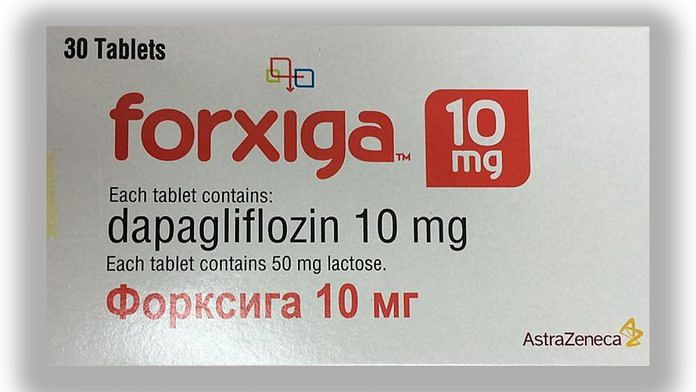New Delhi: The US Food and Drug Administration (FDA) has approved the use of the diabetes drug Farxiga (dapagliflozin) to prevent heart failure caused by abnormal pumping, a condition that is medically termed as ‘reduced ejection fraction’.
The FDA cleared the use of the drug as oral tablets for adults to help reduce the risk of “cardiovascular death and hospitalisation for heart failure”.
“With the approval, Farxiga is the first in this particular drug class, sodium-glucose co-transporter 2 (SGLT2) inhibitors, to be approved to treat adults with New York Heart Association’s functional class II-IV heart failure with reduced ejection fraction,” the FDA said in a statement.
The development should come as welcome news in India where, according to the medical journal The Lancet, “heart diseases and strokes” are among the top causes for deaths.
Doctors in India use a 10 mg Farxiga tablet alone or in combination with other medicines to treat type 2 diabetes. The drug is sold under the brand name ‘Forxiga’ by the UK-based pharmaceutical giant AstraZeneca.
When a drug is approved by the US FDA for certain use, in this case cardiovascular disease, doctors here in India can use the drug for heart treatment under the “off-label” use, i.e., for health conditions not specified by the drug maker.
AstraZeneca, however, cannot promote the drug for cardiovascular ailments unless it holds clinical trials in India and gets approval from the Drug Controller General of India.
Also read: How India can be a world leader in making Covid vaccine and keeping it cheap too
Successful clinical trials
Clinical trials of the drug have shown that it improves the survival chances and reduces the need for hospitalisation in adults with heart failure with reduced ejection fraction.
According to American Heart Association, a normal ejection fraction is more than 55 per cent — which means 55 per cent of the total blood in the left ventricle is pumped out with each heartbeat. “Heart failure with reduced ejection fraction happens when the muscle of the left ventricle is not pumping as well as normal,” the AHA says.
“This type of heart failure happens when the heart’s main pumping chamber, the left ventricle, is weakened,” the FDA said in its statement.
The FDA further said that the drug’s safety and effectiveness were evaluated in a randomised, double-blind, placebo-controlled study of 4,744 participants.
“The average age of participants was 66 years and more participants were male (77 per cent) than female,” it said.
To determine the drug’s effectiveness, investigators examined the occurrence of cardiovascular death, hospitalisation for heart failure, and urgent heart failure visits.
Participants were randomly assigned to receive a once-daily dose of either 10 mg of Farxiga or a placebo (inactive treatment). “After about 18 months, people who received Farxiga had fewer cardiovascular deaths, hospitalisations for heart failure, and urgent heart failure visits than those receiving the placebo,” the FDA said.
“This approval provides patients with heart failure with reduced ejection fraction an additional treatment option that can improve survival and reduce the need for hospitalisation,” the FDA statement quoted Norman Stockbridge, director of the Division of Cardiology and Nephrology in the FDA’s Center for Drug Evaluation and Research, as having said.
Also read: Remdesivir maker Gilead to expand production of drug most sought-after for Covid treatment
Drug has a few side-effects
The drug, however, has a few side effects.
According to the FDA, it can cause dehydration, serious urinary tract infections and genital yeast infections.
“Elderly patients, patients with kidney problems, those with low blood pressure, and patients on diuretics should be assessed for their volume status and kidney function,” the FDA said.
FDA has also warned that patients with signs and symptoms of metabolic acidosis or ketoacidosis (acid buildup in the blood) should also be “assessed”.
But AstraZeneca’s application had received Priority Review designation. This means that the FDA planned to take action on the application within six months, because the drug, if approved, would significantly improve the safety or effectiveness of treating, diagnosing or preventing a serious condition.
Also read: Nicotine patch test on Covid patients, healthcare workers to see if smokers are ‘protected’



